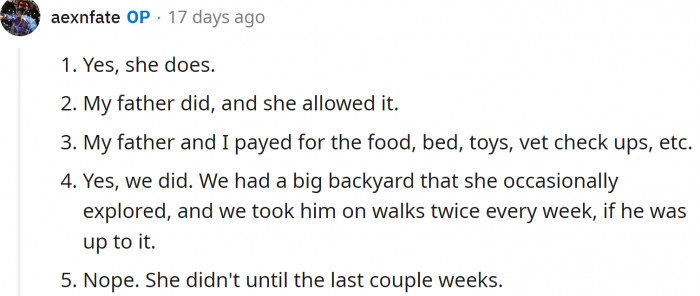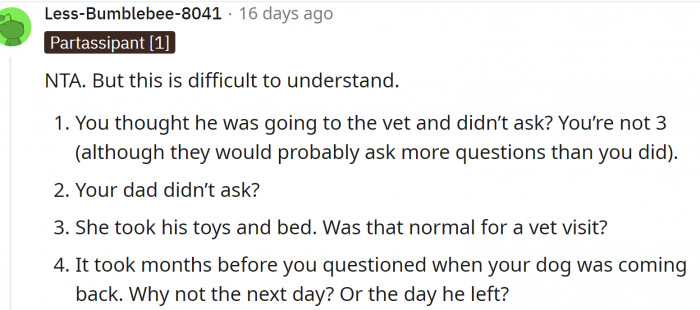Grandmother Sells Her Grandkid’s Puppy Without Telling Them
Getting a puppy has to rank among the most exciting and pleasant experiences of your life. You will always remember the first time you were touched by a cold, wet nose, the first slobbery lick, and the overexcited jump onto your lap.
It is genuinely fantastic to grow up with a dog, especially when the connection between the person and the dog lasts throughout childhood, adolescence, and adulthood. These canine companions have been there for you through it all, including your first day of school, your first breakup, and your college applications.
Well, this applies only if you keep the dog. Things happen—dogs get sick, people have to rehome them because they move to non-pet-friendly apartments, or your grandmother sells your dog behind your back.
Wait, what? This seems like the least likely thing that can happen.
What are the chances? Well, judging by one Reddit AITA post, there is a chance of that happening.
One young Redditor had a dog they loved, and then their grandma from hell decided to sell it without telling them.
Take a look at this story—it is as interesting as it is hard to believe. So, if you are ready...
OP asks:

They had a dog, Max. The 6-month-old puppy was amazing, and they loved it very much.

One day, his grandmother asked OP and his father if they were okay with sending the dog away for a while. OP thought she meant the vet and said it was okay.

Family Dynamics and Decision-Making
The decision to sell a grandchild's puppy without their knowledge raises important questions about family dynamics and decision-making processes. Research from the field of family psychology indicates that such unilateral decisions can create feelings of betrayal and mistrust within families. It’s essential to understand how decisions around pets can reflect broader issues of respect and autonomy.
Studies show that children form strong emotional attachments to pets, so when these bonds are disrupted, it can lead to significant emotional distress.
The Role of Trust in Family Dynamics
Dr. Mark Thompson, a developmental psychologist at Harvard University, emphasizes that trust is a cornerstone of family relationships.
His research indicates that when trust is broken—such as selling a family member's pet without consent—it can lead to long-lasting emotional damage.
Understanding the ramifications of such actions is crucial for rebuilding relationships.
OP's father suggested he take a photo of the dog. And it was the last photo of Max he would take.

When OP confronted her, she admitted to selling the dog for $60.

OP hasn't spoken to their grandmother since. And, to make matters even worse, it wasn't her first time pulling a stunt like this.

Additionally, the grandmother’s pattern of behavior suggests a need for control or perhaps a lack of awareness regarding the emotional impact of her actions. A clinical psychologist explains that some individuals may not fully recognize the emotional stakes involved in family decisions, particularly when it comes to beloved pets. Understanding the emotional implications of such decisions is critical for maintaining healthy family relationships.
It’s important for families to engage in dialogue that emphasizes the emotional significance of pets to all family members.
Studies in the field of family psychology suggest that betrayal within families often triggers feelings of anger, sadness, and abandonment.
These emotions can complicate the healing process, making it essential for family members to engage in open discussions about their feelings.
Addressing these feelings can help restore trust over time.
Redditors needed more info since the whole situation was totally unclear.

More info, we say.

OP provided:

The Consequences of Unilateral Decisions
This case exemplifies how unilateral decisions can lead to conflicts within families. Research shows that when individuals feel their autonomy is undermined, it can lead to resentment and conflict. A study published in the Journal of Family Psychology emphasizes that involving all affected parties in decision-making can enhance trust and reduce feelings of betrayal.
Moreover, fostering an environment where all voices are heard can prevent misunderstandings and emotional fallout.
The Importance of Open Communication
Open communication is vital in addressing breaches of trust within families.
According to research published in the Journal of Family Communication, families that practice transparent communication often experience healthier relationships.
Encouraging family members to share their feelings can help in resolving conflicts and rebuilding trust.
OP's grandmother and father are to blame here.

But, again, so much was unclear here.

OP offered some more explanations.

To mitigate these situations, families should establish clear communication channels and protocols for making decisions that impact everyone involved. Regular family meetings can provide an opportunity for all members to express their views and feelings regarding shared responsibilities and decisions, particularly concerning pets. Research indicates that inclusive decision-making can lead to stronger family bonds and improved emotional well-being.
Encouraging empathy and understanding within family discussions can help foster a supportive environment.
Psychological studies suggest that utilizing conflict resolution techniques can help families navigate trust breaches effectively.
Strategies such as active listening and validating emotions can create a supportive environment for discussions.
This approach can foster healing and promote understanding among family members.
But the answers seemed to be raising more questions.

Again, the answers brought in more confusion.

OP posted an edit, calling out people who didn't believe the problem was real.

Practical Strategies for Rebuilding Trust
To rebuild trust after a betrayal, families should prioritize open dialogue and emotional validation.
Establishing regular family meetings to discuss feelings and expectations can foster a supportive environment.
Seeking the help of a family therapist can also provide valuable tools for navigating these discussions.
Well, what did you think of this story? Are you, like many Redditors out there, finding it hard to believe?
Some of them said that this is clearly rage bait. Others do not believe that some people would lie about something like that.
We are not sure. It looks like the post was written by a kid who is not really good with words, facts, or time periods.
And maybe that’s the problem. Of course, as a kid, it might be that they are not totally aware of the situation in the house.
Sure, the grandparents are living in the OP's home. But maybe the grandparents moved in because the OP's father had financial difficulties.
Maybe they are supporting OP and their dad? And that’s what makes them think they can make decisions like this one…
Behavioral research emphasizes the significance of forgiveness in rebuilding trust within families.
Recognizing the human capacity for error can help family members move past grievances and work toward reconciliation.
Encouraging a culture of forgiveness can strengthen family bonds over time.
Psychological Analysis
This situation highlights the complexities of trust within families and how easily it can be disrupted.
Understanding the emotional impact of such actions is crucial for fostering healing and reconciliation among family members.
Analysis generated by AI
Analysis & Alternative Approaches
In summary, trust is a fundamental element of family dynamics, and breaches can have significant emotional repercussions.
By fostering open communication and employing effective conflict resolution strategies, families can work toward healing and rebuilding trust.
As highlighted by family therapists, addressing emotional needs and promoting understanding are essential for maintaining healthy family relationships.
Analysis & Alternative Approaches
Understanding the intricacies of family dynamics is essential in navigating conflicts around pet ownership. Research underscores the importance of inclusive decision-making and open communication in maintaining healthy family relationships.
By fostering an environment where all voices are heard, families can strengthen their bonds and navigate challenges with greater ease.



